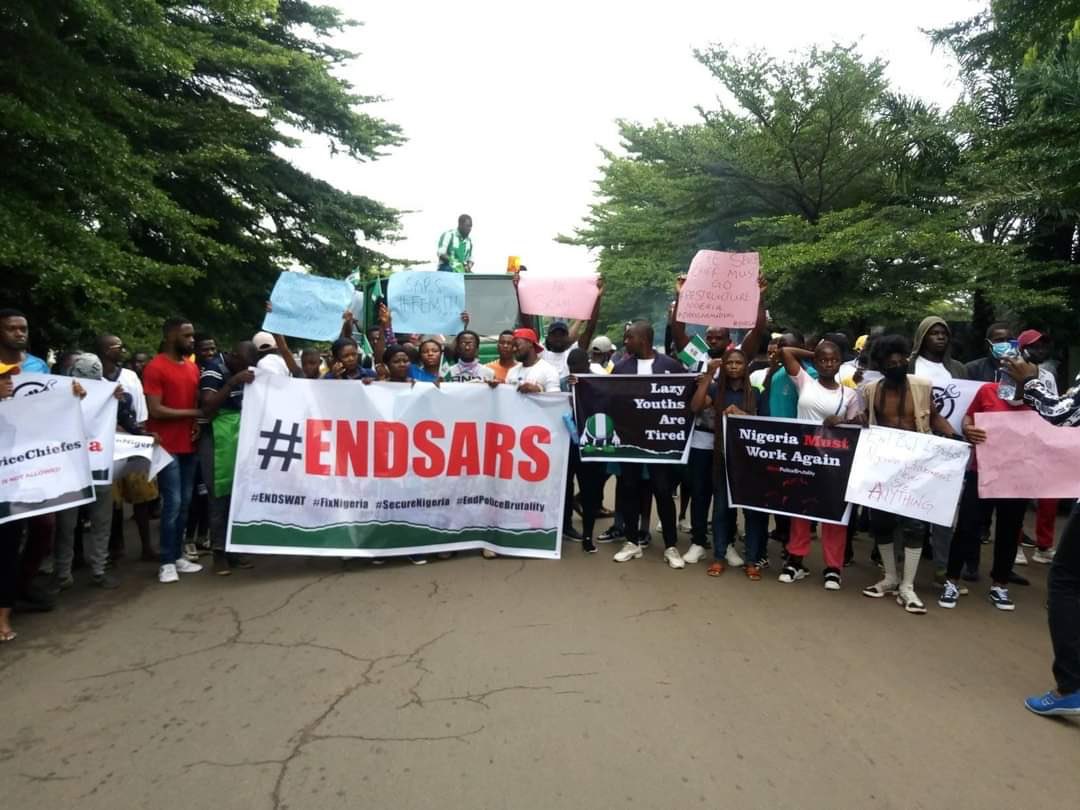Thank goodness, life is gradually returning to normal after the whirlwind of #EndSARS protests across much of the country. The surviving victims are picking up the pieces of their shattered lives, wondering, as we must, why this happened and on the scale it happened. The judicial panels set up by Lagos and several state governments might provide some answers to this and some other important questions.
It is neither foolish nor naïve to hope that through their protests, the youths might have chipped at the rock solid conscience of our well-heeled political leaders and forced them to recognise that their power comes from the people and the right of the people to own their power cannot ever be taken away from them – not through high-handedness and certainly not through police brutality.
The killing turned the peaceful protests into a nightmare for the youths who sought, through them, to impress it upon the federal government to urgently reform the Nigeria Police whose excesses are fully demonstrated by the corruption and the serial crimes against the people by its personnel in SARS. It is a quirk in human management, sadly, that social, economic and political reforms quite often demand blood and destruction.
The #EndSARS could not have been an exception. From the figures of deaths and destruction officially released by the inspector-general of police, Mohammed Adamu, we now know that as at the time of his report, 73 persons were killed, 205 police stations were razed down in a fury of fire, 71 warehouses, in some of which the politicians hoarded Covid-19 palliatives, as well as 248 private stores were looted. Official figures in matters of this nature are often a bit of a safe distance from the full facts. For all we know, these figures could be worse but even if one person was killed, even if one police station was torched, even if one warehouse and one private store were looted, it would still not change the fact that the violence happened because we conflated the right of citizens to protest with the right of the government to stop them when and how it chooses to end the protest.
These are monumental deaths and losses, not just for the direct victims, but for the rest of the country. #EndSARS protests have moved from the streets to our conscience as a nation. The killing of unarmed youths by the agents of the state would be difficult to live down in a hurry. The protests may or may not succeed in reforming the Nigeria Police and our policing system but our youths have served notice that they are watching the political shenanigans and the inexcusable fumbling, the one-step-forward and two-steps-backward cha-cha dance step that have become the defining characteristic of our gallant attempts at moving the nation forward.
We now face the critical challenges of the day after. How we respond to, and manage, the day after would make an enormous difference in how we are governed and how we are policed. #EndSARS was the trigger but it seems to me that the youths wanted to ultimately use the protest to demand some radical responses to those lingering problems that have held our social and political development hostage.
Its being violently cut short in the hands of the Nigerian state means that the youths were not allowed a full stretch of their protests and demands for shaping up the country to give hope to the present generation. But those unspoken demands are being made at several other forums by the politicians themselves who feel encouraged by the courage of the youths to give a voice to their pent up frustrations. The youths have released the genii from the bottle and placed on the government the burden of an honest social, political and economic re-engineering to tackle insecurity, poverty and unemployment.
The day after should now move from the safe path of cosmetics of motion to the more critical path of movement. The federal government promised reform of the force; we are waiting to see what form it takes. Initially, there was a rash of responses by the government and the police authorities to mollify the youths and get them off the streets. SARS was scrapped and replaced with SWAT so the police could carry on with the huge problem of making our country safe from armed robbers. We still wonder, given the paucity of information that attended the name change, if SWAT is another name for SARS or a fully reformed police unit with a different professional orientation. We will know, of course, when its personnel are back on the streets and see if they no longer claim the right to terrorise, brutalise and extort their fellow, non-uniform wearing compatriots.
At the beginning of the protests, the Police Service Commission released information to the effect that 37 former personnel of SARS had been recommended to be cashiered out of the force; 24 others were recommended for prosecution. Actually, this was part of the recommendations of the panel set up by the president in 2018 “to investigate the allegations of human rights violations by SARS and recommend reform of the body.” The panel made some other important recommendations, including renaming SARS Anti-Robber Section, ARS, its original name; the unravelling of 22 officers involved in the violation of the rights of Nigerian citizens; the payment of compensation in respect of 45 established complaints; the arrest and prosecution of two retired senior police officers; one for extra-judicial killing and the other for the illegal takeover of the property of a suspect. The report began to gather dust on the shelf.
Nothing was done and nothing further has been heard about them perhaps because they are stuck in the mud of motion and arrested movement. Perhaps, if the government had acted on the panel report, there would not have been the SARS protests and the nation would have been saved the trauma of deaths and destruction. This being the day after, it should be possible for the government to commit itself and demonstrate its sincerity in initiating and carrying out the reforms. There cannot be a better time than now. The government does not need to be told that it urgently needs to win back the trust and the confidence of the people in its capacity and sincerity in managing the fallout of the #EndSARS protests.
The attorney-general and minister of justice, Abubakar Malami, SAN, was recently quoted as saying that the Nigeria Police did not need reform because it was already reformed. Statements like this by the chief law officer of the federation could succeed enormously in creating the impression that the federal government is rolling back its promise. I hope not. The president’s integrity rides on promises made and promises kept.
Malami also said last week that those who shot the protesters at the Lekki toll plaza were hoodlums in army uniform. Nonsense. I am sure he is living so far away from reality he forgot the army admitted it was invited by the Lagos State governor, Babajide Sanwo-Olu, to enforce the curfew he imposed from 9 o’clock that night. The proper management of the day after does not permit of careless and tendentious statements by public officers. The situation is flammable enough that keeping a match away from it is both sensible and commonsensical.

 Join Daily Trust WhatsApp Community For Quick Access To News and Happenings Around You.
Join Daily Trust WhatsApp Community For Quick Access To News and Happenings Around You.


